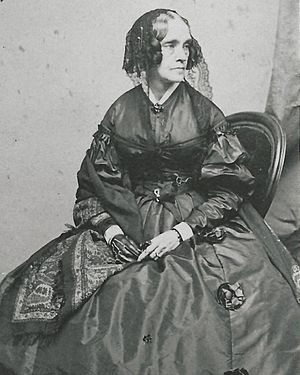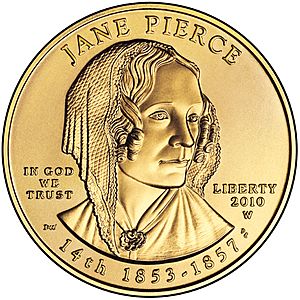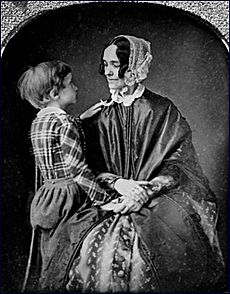Jane Pierce facts for kids
Quick facts for kids
Jane Pierce
|
|
|---|---|

Pierce in 1857
|
|
| First Lady of the United States | |
| In role March 4, 1853 – March 4, 1857 |
|
| President | Franklin Pierce |
| Preceded by | Abigail Fillmore |
| Succeeded by | Harriet Lane (acting) |
| Personal details | |
| Born |
Jane Means Appleton
March 12, 1806 Hampton, New Hampshire, U.S. |
| Died | December 2, 1863 (aged 57) Andover, Massachusetts, U.S. |
| Resting place | Old North Cemetery |
| Spouse | |
| Children |
|
| Parents | Jesse Appleton Elizabeth Means |
| Signature | |
Jane Means Pierce (born Appleton; March 12, 1806 – December 2, 1863) was the wife of Franklin Pierce. She served as the First Lady of the United States from 1853 to 1857. She married Franklin Pierce in 1834 when he was a Congressman.
Jane did not like living in Washington, D.C.. In 1842, she convinced her husband to leave politics. However, in 1852, Franklin Pierce decided to run for president without her knowing. He was elected president later that year.
Just before Franklin became president, their only living son, Benjamin, died in a train accident. This event caused Jane to become very sad. She stayed in a deep sadness for the rest of her life. As First Lady, Jane Pierce mostly kept to herself. For the first two years of her husband's presidency, she mourned her son. Her duties were often handled by her aunt, Abby Kent-Means.
After Franklin's presidency, they traveled for two years. Then they settled in Massachusetts. Jane Pierce died in 1863 from tuberculosis. She did not enjoy political life and was unhappy as First Lady. She was interested in abolitionism, which was the movement to end slavery. She tried to influence her husband's decisions on this topic. Jane was a very religious person, raised as a Puritan. She believed that the sad events in her life were punishments from God. Jane was quiet and avoided politics, which was very different from her husband, who was outgoing and loved politics.
Contents
Early Life and Education
Jane Appleton was born in Hampton, New Hampshire on March 12, 1806. Her father, Jesse Appleton, was a minister. Her mother was Elizabeth Means Appleton. Jane was the youngest of three daughters. She also had three younger brothers.
In 1807, her father became the president of Bowdoin College. Her family then moved to Brunswick, Maine. Her father's strict religious practices made him sick, and he died in 1819. After his death, Jane's family lived with her grandmother in Amherst, New Hampshire. From a young age, Jane was very religious. She followed the strict beliefs of Puritanism and Evangelicalism.
Jane came from a wealthy and well-known family in New England. She received a very good education. She went to public schools and was also taught at home. She attended a special school for young women called Miss Catherine Fiske's Young Ladies Seminary. This school offered a better education than most women received at the time. Jane was good at music and loved reading. However, she chose to focus on studying the Bible instead. She was a shy and very religious person. She also supported the temperance movement, which aimed to reduce alcohol use. Even when she was young, Jane often had poor health. She would get severe colds every winter.
Marriage and Family Life
Jane Appleton met Franklin Pierce when he moved to Amherst to study law. Some stories say they met during a thunderstorm. Franklin supposedly told her not to sit under a tree because of lightning. Another story says they were introduced by Jane's brother-in-law, Alpheus Packard, who was one of Franklin's teachers. She might also have met him when he visited her mother's home.
Jane's mother did not approve of their relationship. Franklin came from a different social class. He also had different manners, and his lifestyle was not what her mother liked. He was an Episcopalian, while Jane's family were Congregationalists. Her family also worried about his political goals. They dated for seven years. During this time, Franklin moved to Hillsborough, New Hampshire to work as a lawyer and serve in the state government.
Franklin and Jane married in a small ceremony on November 19, 1834. By then, Franklin was a member of the United States House of Representatives. People saw them as very different. Jane was quiet and often sad, while Franklin was outgoing and wanted to be a public figure.
After their marriage, the Pierces went to Washington, D.C.. But Jane found the city unpleasant. In 1835, she went to a White House reception with her husband and met President Andrew Jackson. Later that year, she decided to leave Washington. She returned to her mother's home in Amherst while Franklin stayed in the capital. The Pierces later bought a house in Hillsborough. Jane chose to live there when Franklin was away.
In 1838, they moved to Concord, New Hampshire, when Franklin became a senator. Jane encouraged him to resign and leave politics in 1842. Jane strongly disliked politics. Her dislike for it caused problems as her husband became more involved in public life. Even though politics was often a point of disagreement, they were kind to each other. They wrote letters often when they were apart.
Franklin and Jane had three sons, but all of them died young. Franklin Jr. was born in 1836 and died just three days later. Frank Robert was born in 1839 and died in 1843 at age four from a serious illness. Benjamin was born in 1841 and died in 1853 at age 11 in a train accident.
For several years after Franklin's time in the Senate, they lived a quiet family life. Franklin worked as a lawyer to support the family. He briefly left to serve as a brigadier general in the Mexican–American War. This time was often considered Jane's happiest. Her husband was out of politics, and she had two living sons. Their house was sold during the war. The family lived in different places for several months. President James K. Polk offered Franklin a job as United States Attorney General. But Franklin turned it down because Jane did not want him to take it.
While Franklin worked as a lawyer, Jane focused on raising their only living son, Benjamin. She raised him in a very strict religious way. She dedicated herself completely to Benjamin, avoiding other duties. Jane did not do housework because of her health. A married couple hired by Franklin took care of Jane and Benjamin when he was away.
First Lady of the United States
In 1852, Franklin Pierce was chosen by the Democratic Party to run for president. When Jane heard the news, she fainted. He had not told her how much he wanted to be president. He convinced Jane that if he became president, their son Benjamin would have a better chance to succeed in life. Jane often prayed that her husband would lose the presidential election.
While Franklin was president-elect, the Pierce family was on a train that crashed. Benjamin was killed right in front of Franklin and Jane. Jane became even more depressed after seeing her last son die. She blamed Franklin and his political goals for God taking their sons. She did not attend her husband's presidential inauguration. Instead, she stayed in Baltimore for two weeks. Jane was also affected by the deaths of her husband's predecessor, Abigail Fillmore, and Vice President William R. King in the following weeks.
For the first few months of her husband's term, Jane Pierce did not see visitors. She rarely attended public events. She only entertained family and close friends. When she arrived at the White House, she wore black clothes. The White House was decorated for mourning. She did not host social events or manage the White House as First Ladies usually did. Her aunt and close friend, Abby Kent-Means, took on these duties. Jane avoided other people and often spent her time studying the Bible.
Pierce also became friends with Varina Davis, the wife of Secretary of War Jefferson Davis. She took an interest in the Davis' baby son. However, he became sick and died in 1854. Jane slowly got used to being First Lady. Two years into her husband's term, she attended the New Year's reception. After that, she attended the Friday evening receptions.
While she was First Lady, Jane Pierce tried to communicate with her dead son. She sometimes wrote letters to him as a way to deal with her sadness. She also tried to contact him through a séance with the help of the Fox sisters, who were famous in the Spiritualism movement.
As First Lady, Jane Pierce insisted on religious practices in the White House. She told the staff to go to church. She also held religious services in the White House library. Pierce's cousin, Amos A. Lawrence, said that Franklin was very religious when Jane was around. But he drank a lot when she was away. She also sometimes tried to influence her husband when he was president. In 1856, she convinced him to undo the arrest of an abolitionist named Charles L. Robinson. When Jane's health was poor, Franklin would invite many of her nieces and nephews to the White House to care for her.
Jane became interested in abolitionism. After her period of mourning, she started attending Congressional debates to follow the issue. At the end of her husband's term, she again chose not to attend the presidential inauguration. This was for her husband's successor, James Buchanan.
Later Life and Death
The Pierces stayed in Washington for a month after Franklin's presidency ended. Then they traveled around New England during the summer. They traveled abroad for two years. When they returned, they bought land in Concord. Before leaving again for the West Indies, Jane avoided Concord because it reminded her of her dead son. She often stayed with relatives in Massachusetts for the rest of her life.
During the American Civil War, Jane supported the Union and the cause of abolitionism. This was different from her husband. He supported keeping slavery to preserve the nation and the Constitution. Jane Pierce's tuberculosis got worse after leaving the White House. She died on December 2, 1863. She was buried at Old North Cemetery in Concord. Her husband was buried next to her after he died in 1869. In her will, she gave money to the American Bible Society, the American Society for Foreign Missions, and the American Colonization Society.
Public View and What She Left Behind

The public first learned about Jane Pierce in a book about her husband. This book was written by their family friend, Nathaniel Hawthorne, when Franklin was running for president. The book highlighted her poor health. This made people think she was a sickly woman, a reputation that continues today. When she was First Lady, Jane Pierce was seen as unwell and a sad presence in a sad White House. However, people did feel sympathy for her grief. During her time as First Lady, she was known as "the shadow of the White House."
She did receive some criticism from the public. This happened after she canceled the Saturday evening Marine Band concerts. She did this out of respect for the Sabbath, a day of rest. Hawthorne once wrote that she "wasn't really of this world."
Historians generally rank Jane Pierce low among First Ladies. Surveys show she is considered one of the least effective First Ladies. She is also one of the least known. This is partly because she served before the role of First Lady became very public. Also, her husband's presidency is not widely remembered. Like other First Ladies from before the Civil War, she often avoided public attention. She was seen as having little importance to her husband's government. She is thought to have had little impact on the role of First Lady. She did not set new examples for those who came after her.
Jane Pierce's influence on her husband showed through her dislike of politics. This included her role in his decision to leave the Senate in 1842. Some experts have suggested that in her relationship with her husband, she might have felt a religious need to "save his soul." They think she might have been drawn to him because of his faults, not despite them. While people at the time generally felt sorry for Jane Pierce, historians in the 20th century sometimes described her as a hypochondriac. They said she failed to support her husband during sad times. They also saw her as a harmful factor in her husband's presidency, which was not well-received.
Political Beliefs
Jane Pierce was a Puritan, and her religious beliefs shaped how she saw the world. Her faith made her believe that suffering was a punishment from God. She strongly disliked the political and social life in Washington, especially the many parties. She was raised as a Whig. This caused problems with her family when she married her husband, who was a Democrat.
Jane Pierce also supported the abolitionist movement. This was against her husband's view. He allowed slavery in the name of states' rights. During the American Civil War, she wanted the Union to win. Jane Pierce admired Andrew Jackson when he was president. She disliked Representative Davy Crockett, thinking he was "conceited, stupid, [and] silly."
Images for kids
See also
 In Spanish: Jane Pierce para niños
In Spanish: Jane Pierce para niños
 | DeHart Hubbard |
 | Wilma Rudolph |
 | Jesse Owens |
 | Jackie Joyner-Kersee |
 | Major Taylor |


